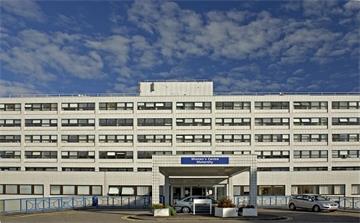OUH a specialist centre for women during pregnancy
24/03/2023
This article is more than one year old.

Women's Centre, John Radcliffe Hospital
Oxford University Hospitals (OUH) is one of 17 new centres of excellence that help women with pre-existing medical conditions, or conditions that arise during pregnancy, to quickly get the extra care they might need.
Maternal Medicine Networks bring together specialist multi-disciplinary teams and establish centres of excellence in every part of England to ensure that all women have timely access to specialist medical advice during pregnancy.
OUH is one such site, which piloted the scheme from 2018, alongside others including Guy’s and St Thomas' and St George's in London, and across Liverpool, Manchester, and Newcastle.
Most conditions, like well-managed diabetes, can be safely managed locally. The most serious cases will be treated at these 17 centres, where they will be closely monitored and provided with specialist treatment throughout their pregnancy.
The networks bring together expert physicians, obstetricians, midwives, nurses and other clinicians in one place, led by a dedicated multidisciplinary team. They work with local GPs, emergency departments, and community midwifery services to ensure all pregnant woman can access these services when needed.
Gill Bennett, 42 from Buckinghamshire, developed complications three months into her second pregnancy with her daughter Emily.
She began experiencing severe dizzy spells, but it wasn't until a routine midwife appointment that she was referred to a cardiologist and diagnosed with arrythmia – a potential cause for concern for both mother and baby.
After visiting her local hospital when her symptoms worsened, she was rushed to the John Radcliffe Hospital, part of OUH, in an ambulance, where she spent the week in the Cardiac Critical Care Unit.
Gill said: "It was extremely frightening, I could sense the urgency and seriousness of the situation and, at 28-weeks pregnant, I thought I may not make it."
Since then Gill has been cared for under the specialist maternal medicine centre at the John Radcliffe.
She said: "The care I've received at the John Radcliffe has been phenomenal and my family and I are so grateful to the teams who have treated me. I was looked after by specialists in both cardiology and obstetrics for the last two months of my pregnancy and I felt in very safe hands."
Daughter Emily was born safe and healthy at the hospital in June 2022 at 39 weeks by caesarean section.
Gill added: "I had no idea I had a heart condition until my second pregnancy, and it's scary to think that my daughter Emily and I may not be here today if it hadn't been for the specialist care I’ve received at the John Radcliffe – I can’t thank them enough for everything they've done and for their ongoing support and care."
Though maternal mortality in England is very rare, the majority of maternal deaths are caused by medical conditions that pre-date or develop during pregnancy, such as cardiac disease (23 per cent), blood clots (15 per cent), and epilepsy and stroke (13 per cent) – that can be missed or misattributed to pregnancy.
Lucy MacKillop is a Consultant Obstetric Physician at Oxford University Hospitals and the Regional Obstetric Medicine Lead and Chair for the Thames Valley Maternal Medicine Network.
She said: "I am very proud to chair the Thames Valley Maternal Medicine Network, a group of dedicated health professionals helping to ensure that women and families get the personalised care and support they need at such a special time in their lives.
"We serve a population of around three million people, with around 40,000 births a year in our geographical footprint, and it is vital that we support everyone with significant medical conditions that pre-date or arise in pregnancy so they have equal access to timely specialist care and advice.
"We support people with complex medical needs before, during, and after their pregnancy, and our aim is to give them and their babies the best care and safest experience possible."